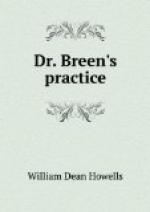“Oh no, not at all; I had rather an aversion at first,” she replied, with the instant superiority of a woman where the man suffers any topic to become personal. “Why did you think I was drawn to it?”
“I don’t know—I don’t know that I thought so,” he stammered. “I believe I intended to ask,” he added bluntly; but she had the satisfaction of seeing him redden, and she did not volunteer anything in his relief. She divined that it would leave him with an awkward sense of defeat if he quitted the subject there; and in fact he had determined that he would not. “Some of our ladies take up the study abroad,” he said; and he went on to speak, with a real deference, of the eminent woman who did the American name honor by the distinction she achieved in the schools of Paris.
“I have never been abroad,” said Grace.
“No?” he exclaimed. “I thought all American ladies had been abroad”; and now he said, with easy recognition of her resolution not to help him out, “I suppose you have your diploma from the Philadelphia school.”
“No,” she returned, “from the New York school,—the homoeopathic school of New York.”
Dr. Mulbridge instantly sobered, and even turned a little pale, but he did not say anything. He remained looking at her as if she had suddenly changed from a piquant mystery to a terrible dilemma.
She moved toward the door. “Then I may expect you,” she said, “about the middle of the afternoon.”
He did not reply; he stumbled upon the chairs in following her a pace or two, with a face of acute distress. Then he broke out with “I can’t come! I can’t consult with you!”
She turned and looked at him with astonishment, which he did his best to meet. Her astonishment congealed into hauteur, and then dissolved into the helplessness of a lady who has been offered a rudeness; but still she did not speak. She merely looked at him, while he halted and stammered on.




